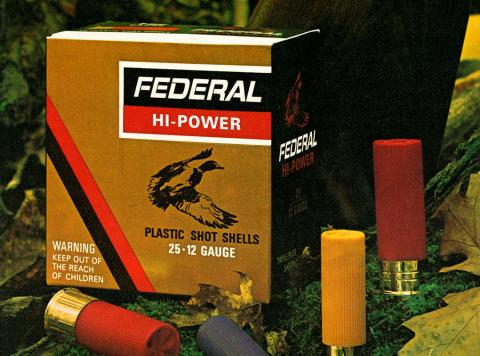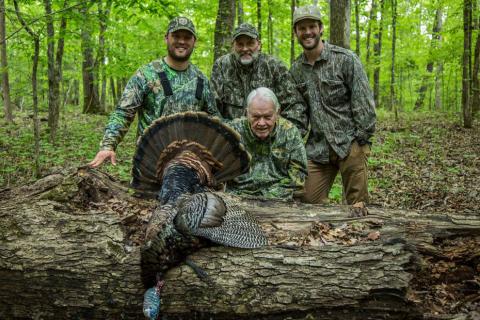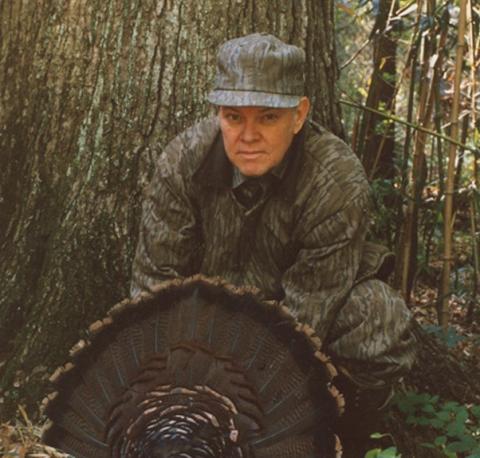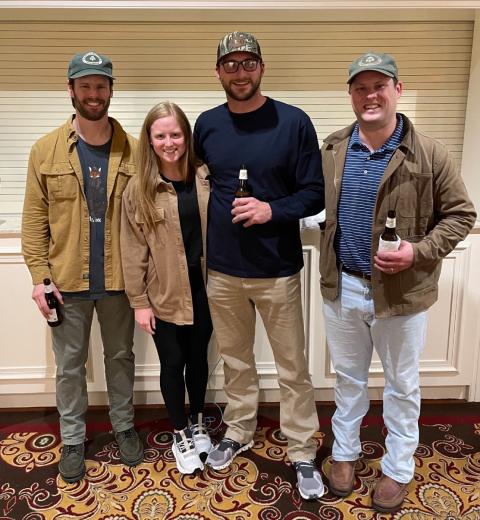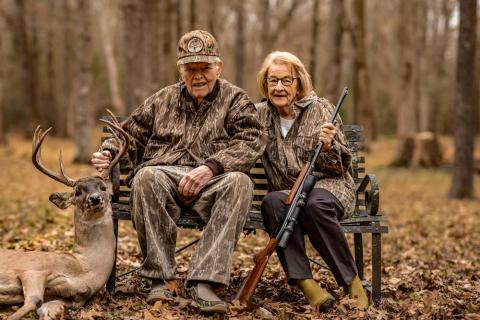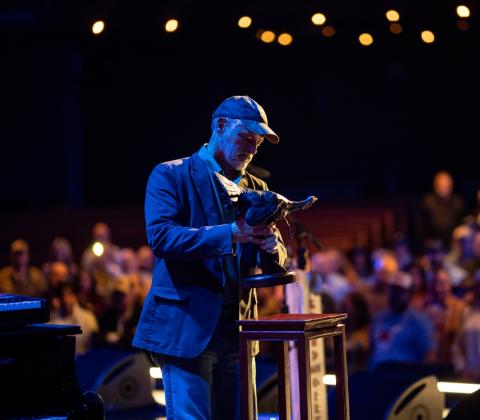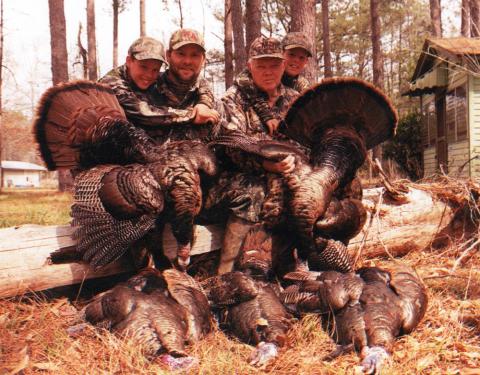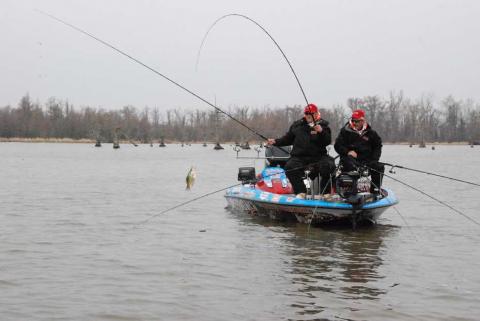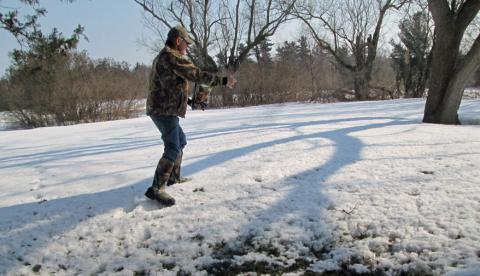Donald Devereaux Jarrett | Mossy Oak Pro Staff

My friend Bobby Knight and I have hunted three decades together now, and we have learned to trust each other without hesitation in the turkey woods. We have spent more hours in the turkey woods together than anybody else I know, though our hunts have been limited these last few years. We have always tried to squeeze in a hunt or two every year since the early days, however, and this was our day to get after them.
We headed to a place I had become pretty familiar with in recent years and the birds were starting to get rolled. It had taken some time to learn the lay of the land and figure out where the birds preferred to be at different times of the day, but I had begun to gain some ground here.
We had planned the hunt well in advance and had vowed not to let anything cause a postponement or cancellation. We were pretty pumped about getting into it with a bird or two, and as we drove toward the place I had recently tangled with some birds, I explained the scenario we might see.
The only problem we had as we stood near the truck with the morning light now invading our space was, the birds were a no-show, or they were acting like it anyway. They were acting like turkeys. I had to do some crawfish maneuvers now as I had built the area up pretty good. "Of all the mornings to behave so rudely," I thought to myself, shaking my head at the silence. Still, though, I believed we would get on a bird at some point, and it wasn't part of our make-up to throw in the towel at daylight. Mid-day would be the earliest we would send up the "white flag" and likely it would be long after that before we bowed out of a turkey hunt. Our hunts together were too rare to give up without our best effort.
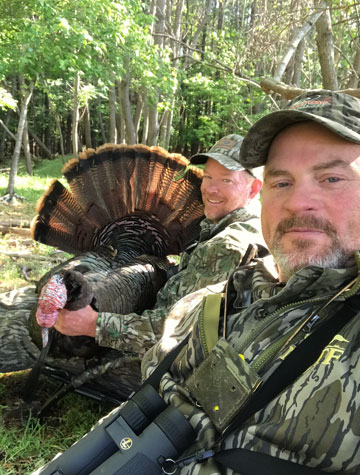
My owling had gone unanswered the first three or four series that I had thrown in any direction and now the frustration was climbing on board. The next series I gave was from down deep and a bird must have felt some sympathy soon after the last note floated across the pines. He was a lot further than we had hoped, but he was a volunteer to us. "Come on," I said as I lead us through the tall pines between us and the bird. After covering a couple of hundred yards, we stopped and I owled again.
The bird was apparently wide-awake now as he hammered it with a bit more enthusiasm than before. I told Bobby that he sounded like he was in the upper end of the draw off to our east and that a bird had been roosted there just a few days prior that had chosen to follow the draw down deep into the property before climbing out of it and disappearing. Thinking it might be the same bird, I suggested we double-time it to a roadbed that led close to the top edge of the draw. We would check him again from there, and if he was coming down the draw, we could easily drop down in front of him and get in his way.
Once we made it to the edge of the draw, I owled again. He responded and we weren't able to tell if he was heading our way or not, so we decided to set up for a bit and see what he was going to do. A couple of gobbles later we were convinced that he wasn't coming down the draw, or at least if he was, he certainly was in no hurry to do it. I had a plan in mind that would get us closer to the bird and was confident we could get there with no threat of getting busted while we moved. Twenty minutes later, we had reached our destination. We picked a setup and settled in. A call or two later got a response, but it seemed further away now. We decided to stay put and give him time.
We have all had birds do this type of thing to us at some point and it used to make me cringe every time it happened to me. Obviously, we want to set up as close as we can without messing up the hunt before it even gets started, but when a bird doesn't open his mouth until well after daylight, as close as you can get might be a long way off. Such was the case for Bobby and me that morning.
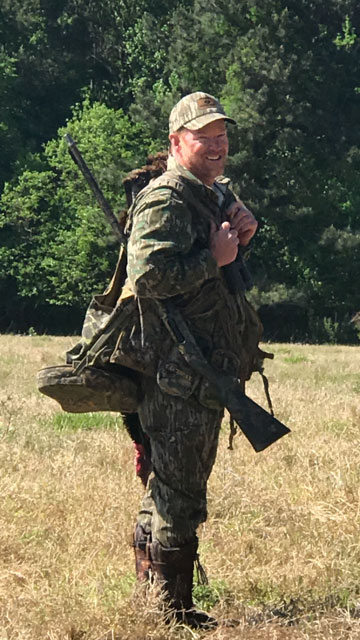
In my earlier years, I would have taken off after this bird like I wanted to catch him, but time has taught me plenty and I knew, we knew, better. The woods were wide open and eventually we would get seen before we could get as close as we might have wanted. There are other ways to deal with birds such as these.
The Beauty of a Call: I think we all forget, misplace or flat out fail to utilize things we learn through the years in the turkey woods. We complicate the situation and make some hunts way harder than they ever have to be. Sometimes the simplicity of it makes it appear doubtful. Once I began to understand that birds will sometimes travel a very long way to get to where you are, I began to play that card more often. Why, so often, do we think there is a magical distance we have to get to before we think a bird will commit? I firmly believe if a bird answers you, even once, he is capable of closing the distance. That all depends on his desire to do so, of course, but we often put more limits on birds than they put on themselves.
We are talking about a bird that might potentially cover several miles a day. He might be following hens. He might be lonely and be looking for hens. He might be heading to greener pastures. The point is, he doesn't care about distance, and if we catch him in the right frame of mind, he might just cover the distance, even a very long distance, to get inside the range of your gun. With that being said, save yourself for the next time you have to get on your horse by giving him some time to get to you.
Personally, I don't have any issues whatsoever with walking all day to get on a gobbler, but I also have no issues with letting a gobbler do the work if he is willing. If I have a choice of walking 600 yards to get to a bird or letting him walk 560 yards to get to me, I'm going to let him do it. That's the beauty of the call. I know I have calls at my disposal that will carry great distances and I don't mind using them. It never hurts to send him an invitation and see if he accepts.
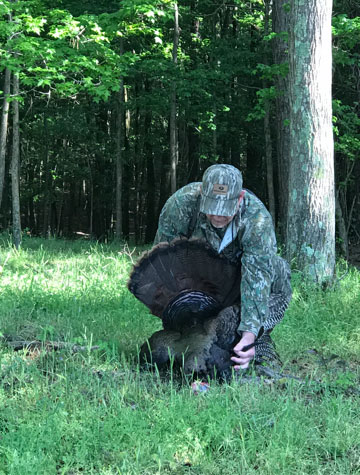
The Dreaded "P" Word: Ok, I know that if you have hunted turkeys for any amount of time, you have likely had someone tell you something to the effect of, "Patience kills more turkeys than anything." It might not be something you want to hear either, but it is just a plain fact. The more of the stuff you have, the better your chances are of throwing a big old gobbler over your shoulder. Think about it. Have you ever ended a hunt by getting up from your setup too soon? Maybe spooked a bird that was on the way because you got up seconds before he arrived? Have you ever left a place where you worked a gobbler for a little while only to have a bird gobble from the spot you left just 10 or 15 minutes later? I would honestly have to answer those questions with, "Yes, Yes and Yes". It's embarrassing, but it's something I have experienced and really had to work on to decrease the times it happened.
Shop Easily at Walmart: Turkey Hunting Button Down
You absolutely have to give a bird time to show up. There is little that is more frustrating than putting in 59 minutes working a bird and having him show up in 60 as you get up to leave. So, how long is long enough? Simply put, as long as it takes. The more you hunt turkeys, the more apt you are to learn when the game is likely over. You will still get embarrassed from time to time, but at least you can live with it if you call it quits and you gave it the effort you feel is your best. Turkeys demand your best effort. So should you.
Pay attention to the way birds behave at a distance. Are they mouthy? Do they gobble very little? It helps when you can watch a bird, of course, but the ones you can't see will test you to the extreme sometimes. You are ultimately the only one who can tell you when you have waited long enough for a bird to show up. I can promise you though, the more you want him, the more patient you will learn to be.
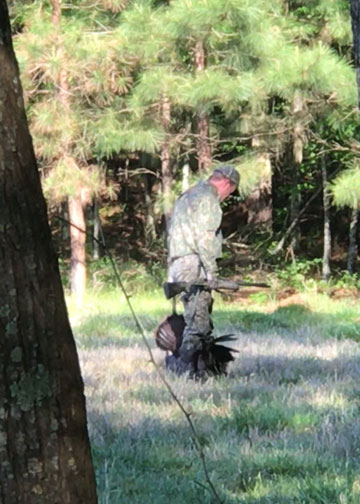
Hot or Not: It's easy to "Hold Point" when a gobbler is screaming at you every time you touch the call, and easier still if he's heading your way while he does it. The scenarios are endless of how a bird will treat you once you set up to go to work on him.
The hot ones are more apt to hold your interest and they will keep you focused as well. Sometimes the mouthy birds will run in from long distances until you stop him with a swarm of turkey load. Others might gobble plenty and take their time, eventually showing up again, only to get his noggin dusted. Those are great hunts to be had for sure, but what about the ones that let you know they are in the neighborhood and then zip it up, seemingly forgetting that they can gobble whenever they want to? These are the types that cause many hunters to go home alone. "Is he coming or not?" is a question you will likely ask yourself and your answer could make or break the hunt. Sometimes you have to stay longer than you think you should and longer than you want to. That's exactly where Bobby and I found ourselves that morning when we pulled a few gobbles from a "Long-Distance" bird.
The bird gave us little indication that he was on the way when we decided to anchor down and he completely disrespected us after gobbling at the first call we made and then cutting it off. He waited a half hour before gobbling again, and he was spouting off to crows when he did. We did get a sense of satisfaction though when another bird gobbled a second later. He was in the same direction but even further than the bird we had initially tried to start a conversation with. Bobby and I spoke in a tone just above a whisper and reminded ourselves of the birds we had seen through the years that would come from greater distances than the initial bird we were trying to convince that the walk was worth it. We sent a few calls in their direction, but got no response.
Turkey Sounds: How and When to Use Them
We proceeded to throw an occasional call out in their direction for the next couple of hours. We didn't even get a courtesy gobble for our effort. This was our breaking point and we knew it. Without much as a hint to each other that we were about to do it, we both began to kick up a major turkey fuss. Cutting, fighting purrs, gobbling, you name it. This had worked on occasion over the years and, as was the case at that particular moment, it was usually a last ditch effort to break a bird - a Hail Mary so to speak. One of the birds gobbled, but apparently hadn't taken one step in our direction since the last time he had gobbled.
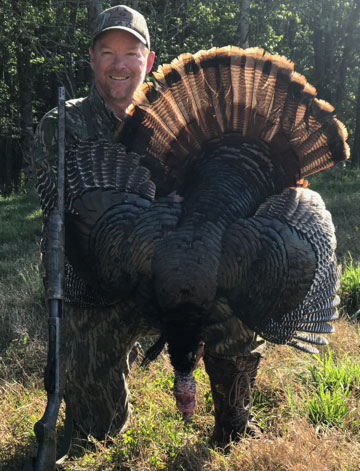
We leaned back in our chairs and knew we were about to run out of concern for either of those two cantankerous old birds. Three hours had passed since the first gobble of the morning and we had heard no more than half a dozen or so since. Another 15 minutes had passed since our ruckus and we still didn't have a bird in front of us. Bobby decided it was time to get up and stretch a bit at this point and I was thinking the same thing. I slid myself to the front of my chair and stretched my back as I peered over the small rise above the hardwoods into the bottom below.
"Whoa, whoa, whoa!” I whispered loudly to Bobby. He froze and knew instantly that there was a turkey in sight. There was, briefly, as I saw a dark form of a bird pass through the lane where I could see into the bottom. I was sure it was a gobbler but was unsure if he had seen us. Bobby scrambled back to his seat and I called softly to check the bird. Seconds later, I spotted the gobbler on the opposite slope of the bottom, now some 100 yards or so away from us. He was standing in a half strut, staring in our direction and I supposed he had climbed the opposite slope for safety reasons and to get a better view of where the hens he was hearing were supposed to be.
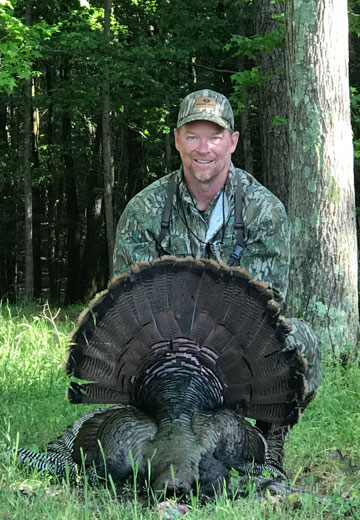
I scratched lightly in the leaves beside me when he strutted broadside a few feet. He raised his head and then began walking down the slope toward the bottom. At one point, I could only see his head - that distinct, white noggin that now stood out like a neon bulb in contrast to the dark, shady bottom he was in. He took a few more steps and disappeared only to reappear less than a minute later in the corner of the opening to my left. "How in the world did he do that?" I wondered. He strutted in one spot for a minute before Bobby began purring to the bird. He then began slowly strutting back and forth, getting closer with each step. When he was close enough, I cut sharply and a bird gobbled directly over the rise on the edge of the bottom a second before Bobby folded the strutter.
It finally dawned on us that both birds had come to investigate the fracas we had kicked up earlier. They hadn't announced to the world that they were on their way. They didn't charge in like their tails were on fire either. They had simply decided to investigate when curiosity got the best of them. They came in to sneak a peek and it cost one of them dearly. Throwing some calls a good distance and utilizing some of that patience stuff was the perfect recipe.

















